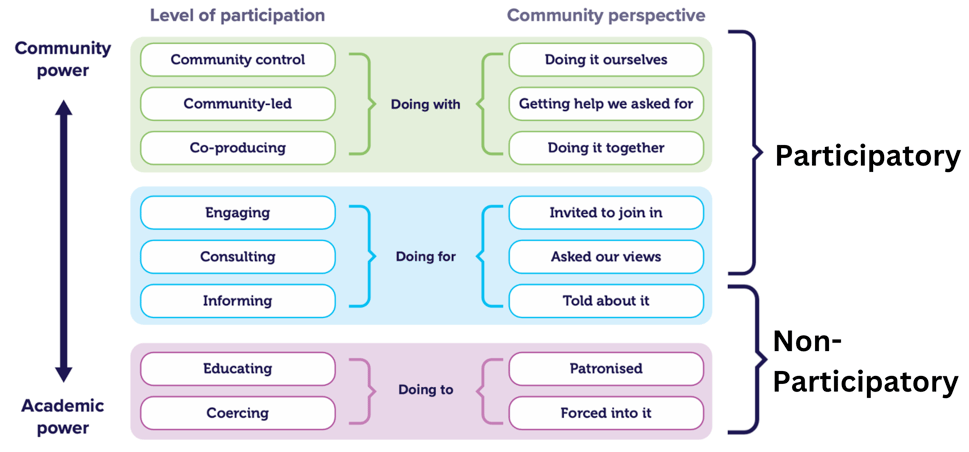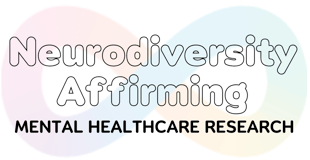
Inclusive and Participatory Research
This research is conducted with and for the neurodivergent community to drive meaningful change in mental healthcare support to improve accessibility.
Our project employs a rigorous co-design process with a Community Advisory Board, following best practice guidelines for participatory research.
We meaningfully and purposefully include lived expertise in every stage of our work, ensuring our research is grounded in real-world needs and perspectives.
Our commitment to genuine community engagement ensures that our findings represent the needs, preferences and experiences of the neurodivergent community and to translate these findings into practical improvements in mental health care accessibility.
The Importance of Inclusive and Participatory Research
Inclusive and participatory research approaches are crucial for producing neurodiversity-affirming research that is ethical, relevant, and beneficial to the neurodivergent community.
Here are key reasons why this type of research is important:
Giving neurodivergent people a voice: This approach ensures that neurodivergent individuals have a say in research that directly impacts their lives. It respects the principle of "nothing about us, without us", recognising that those with lived experience should be central to discussions and decisions about neurodiversity. This involvement can range from consultation to full co-production of research.
Producing more relevant research: By involving neurodivergent individuals in setting research priorities and designing studies, the resulting research is more likely to address issues that truly matter to the neurodivergent community. This can lead to more practical and applicable outcomes that better serve the needs of neurodivergent people.
Improving research quality and impact: Neurodivergent individuals bring unique perspectives and insights that researchers might otherwise overlook. Their lived experiences can inform research questions, methodologies, and interpretations of results, leading to more comprehensive and nuanced findings. This can significantly enhance the overall quality and real-world impact of the research.
Addressing power imbalances: Traditionally, research has been conducted 'on' rather than 'with' neurodivergent people. Inclusive and participatory approaches aim to rectify this by sharing power more equitably between researchers and community members. This can involve joint decision-making, shared control over research processes, and equal valuing of different types of expertise.
Empowering neurodivergent people: By valuing the expertise of neurodivergent individuals and involving them in research processes, these approaches can build confidence and skills within the community. This empowerment can extend beyond the research context, potentially leading to greater self-advocacy and community leadership.
Creating more accessible outputs: When neurodivergent people are involved in the research process, they can provide valuable input on how to make research findings and resources more accessible and useful for the broader neurodivergent community.
Promoting a strengths-based view: Inclusive research often shifts the focus from a deficit-based model of neurodiversity to one that recognises and values the unique strengths and abilities of neurodivergent individuals. This approach can help to challenge stereotypes and promote a more positive understanding of neurodiversity.
Contributing to societal inclusion: By modelling inclusive practices and producing research that accurately represents neurodivergent experiences, this approach can contribute to greater acceptance and inclusion of neurodivergent people in wider society. It can inform policies, practices, and public understanding in ways that support true inclusion.
Through these mechanisms, inclusive and participatory neurodiversity research not only produces more relevant and impactful scientific knowledge but also contributes to broader social change and empowerment of the neurodivergent community.
By embracing inclusive and participatory approaches, neurodivergent researchers can conduct more ethical, impactful studies that truly benefit the neurodivergent community.
This research project is committed to inclusive research practices that empower neurodivergent voices throughout the research process.
Understanding Community Participation in Research
Our research approach is guided by the principle of meaningful community involvement. To illustrate this, we use a model that shows different levels of community participation in research:


Image Source: de Houting, 2021
This diagram represents a continuum of community involvement, ranging from "Coercing" at the bottom to "Community control" at the top. As we move up the levels, we see a shift from academic-driven research to community-led initiatives:
Coercing/Educating: Research done on the community
Informing: Community told about the research
Consulting: Community views are sought
Engaging: Community invited to participate
Co-producing: Research done together with the community
Community-led: Community initiates and leads research
Community control: Full community ownership of research
Why This Matters
This model is crucial because it helps us:
Recognise different levels of community involvement
Aim for higher levels of participation in our research
Shift power from academics to community members
Ensure research is relevant and beneficial to the neurodivergent community
Promote ethical and respectful research practices
Our Commitment
We strive to operate at the higher levels of this continuum, aiming for co-production and community-led research.
We believe that by empowering neurodivergent voices in the research process, we can produce more meaningful, relevant, and impactful outcomes that truly benefit the community we serve.
By understanding and applying this model, we continually work towards more inclusive, participatory, and effective neurodiversity research.
Get Involved
Get involved in shaping this important research.
Stay Informed






Stay informed by registering for our quarterly email newsletter to receive the latest updates and insights from our research.
Expression of Interest to Participate in Research
Neurodivergent adults interested in sharing their perspectives to help shape more inclusive mental health support are invited to register their expression of interest to receive emails about potential opportunities to co-design and participate in our research studies.
Application for Community Advisor Board Member
We welcome neurodivergent individuals to express interest in joining our advisory panel, where your lived experiences and insights will directly guide the direction and implementation of this vital research.
